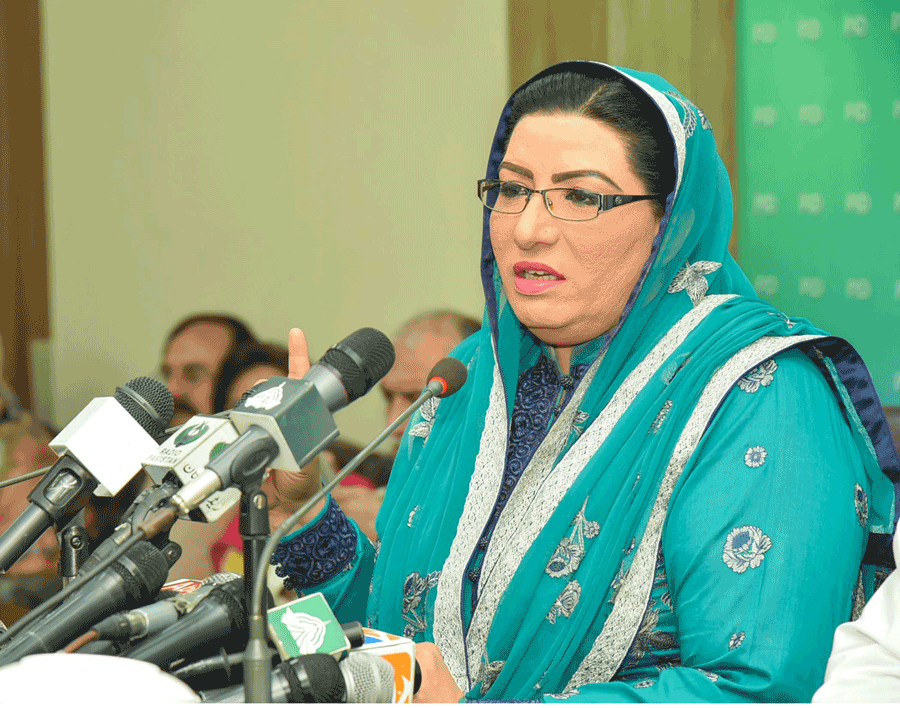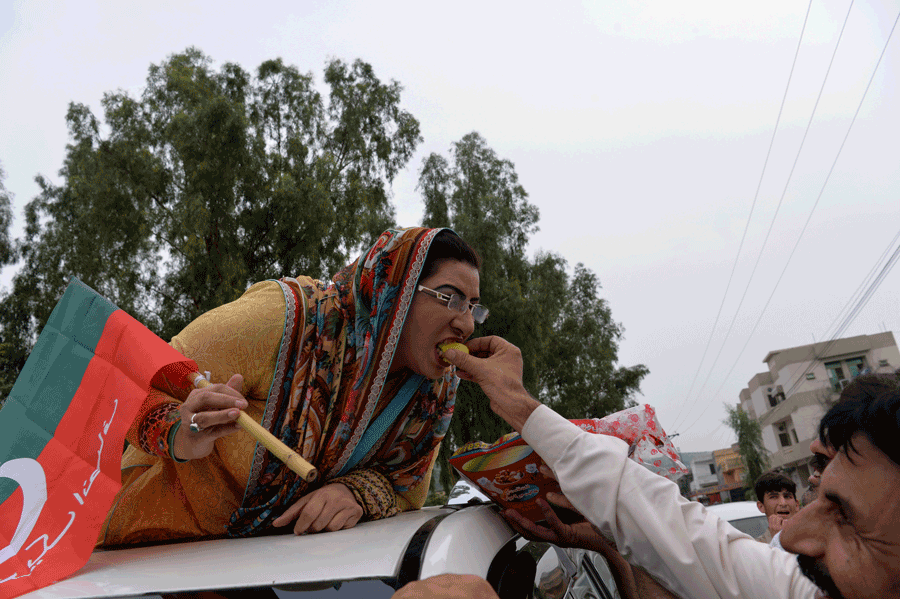Interview: Dr Firdous Ashiq Awan
By Shiffa Z. Yousafzai | Interview | Published 6 years ago
How do you find the Information Ministry different from the time when you first became the information minister in 2010?
When I first took over as minister for information and broadcast, that was a transitory phase from the print media to the electronic media. People started to understand that print media was turning into the secondary mode of communication and electronic media had taken a lead. Now, after seven years, there is another transition taking place, which is from the electronic media to social media. In 2010, I established an electronic media directorate and today, after understanding the challenges that we can overcome through modernisation and digitalisation and technological interventions, it is very important that we have a social media cell in this ministry. I have established that and ultimately, we are going to raise a qualified and technical team so that a platform can be created for all the ministries where we can connect with other stakeholders regarding government policies and promoting the initiatives of Prime Minister Imran Khan. This is the easiest and fastest way of communicating with the international community. The disconnect between different ministerial departments is a challenge for us. Social media should be monitored, not censored and we shouldn’t compromise on our social, cultural and religious norms. The social fabric should stay intact.

What are your top three priorities as information minister, under the umbrella of reforms?
First, to introduce digitalisation based on the new technology, to come at par with the rest of the world. I want to restructure, restrengthen and revamp PTV, Radio and other such state media organs. Second, PEMRA. There is a congestion on cable channels and DTH is one of the areas where we want to create a healthy competition and end the monopoly of certain channels and cable operators. So DTH is needed to end the monopoly and to allow new channels to [enter] the race as well. Third, capacity-building of media practitioners, technicians, and all those people who work in this industry and, for that reason, I want to establish a media university. It will train all those who are directly linked with flow of information.
Do you think there are curbs on the media and is press freedom shrinking?
No, I don’t think so. It is a censor-free media. People do have the right to express themselves. And as a government, we support that freedom. I consider journalists to be an important pillar of the state and I personally want to engage with them for the image-building of the country. I want that they should highlight the enlightened, moderate and progressive face of Pakistan.
Are there any areas that you think a responsible journalist shouldn’t report on?
One area where people report and that hurts me is… national security and sovereignty. National security is one area where we should not compromise at all. There shouldn’t be any negativity spread about our mainstream issues that are linked to our national interests.
How is your government ensuring that there is no censorship on the media?
It is a free media. Whatever you want to communicate to the common man, you are communicating. Whatever you want to print, you are printing. Whatever you want to advocate, you are advocating. Whatever is in your mind, you are reflecting in your news stories and in your articles. Where is the censorship? I don’t see anything being censored. Censorship is only in our minds. And it is the government that is facing censorship because we cannot communicate what we want to communicate. The media should behave as a responsible entity linked with national sanctity, national unity and national interest.
Do you think enough time and space are given to the opposition and other parties, in the media?
I am least bothered about that. It is not about who is occupying the screen more, or who is frequently visible on the media – it is about argument and substance. The opposition is being given excessive space by the media. However, I don’t want them to get less space, because when they are given excessive coverage, they end up exposing themselves. When you aren’t on the screen constantly, people have some expectations of you, but when you don’t have any arguments to address the core issues of the masses and come crying to the media for your own personal relief, then that exposes your vested interests.
What is the government doing about people working in the media industry who have not been paid their dues by channels for several months now?
This is unfortunate and a very serious issue. And I am looking into it seriously. Because everyone who is employed has some basic rights to get all the perks and privileges as laid down in their agreement. So, if that is breached and nobody is taking care of it, then that is our responsibility and we are communicating with the relevant stakeholders so that they address this issue of their employees. I will keep hammering that media channels should pay workers their dues. We are even trying to clear the pending dues of the previous governments.
Do you feel advertisements are used – or misused – to shape opinions and tame the media?
Advertisements cannot really change the objectives, or change the basic narrative. The narrative speaks for itself, if it has substance. Yes, advertisements do help media owners to ease up their businesses. When they are comfortable, they pay their employees well. And when they pay their employees well, then, directly or indirectly, it supports the environment. However, if they are uncomfortable and there is workers unrest, then surely they will express their anger and exploit the situation to create the impression that advertisements are being used to tame the media.
What is the relationship between your government and media like? If an anchor reports something that a government official doesn’t like, should he or she beat up the anchor, or take legal action?
I have been in politics for the last 20 years. And I have faced some very hard times too. People have both positive and negative mindsets. You come across different sorts of people and you have to have a great tolerance level. You are not supposed to react. On many occasions, I face some hard-hitting questions, and I think, had this person asked me this question when I was not the information minister, I would have answered him differently. But now, I am the information minister and I have a certain responsibility. It is not me responding as Dr. Firdous Ashiq Awan, but me responding as a spokesperson of the government and the prime minister. So I have to be more careful.

How is your government handling the pressure coming from the opposition and its threats of starting an anti-government campaign?
In politics, there is no question of any pressure. A successful politician never feels pressured. It is a nerve-testing war. And you have to keep yourself calm and follow your own roadmap. Ultimately, your performance will answer the questions raised. They want to engage you and put up speed-breakers and obstacles in your way – you should be cognisant of their trap.
What is Maulana Fazl-ur-Rehman hoping to achieve by getting the opposition to unite against the government?
Basically, the Maulana is undergoing severe agony, because since 1988, he has never been out of power. He has always been a part of the Parliament, and he has been associated with various governments, in one way or another. He is not in Parliament now and that irritates him. He is missing out on the government’s perks and privileges. And he is trying to link [his own frustrations] with the budget. But no one is taking him seriously. He can only use his madrassa students [to his advantage], but he cannot do anything else.
How do you view Shahbaz Sharif’s offer of the Charter of the Economy to your government?
The Charter of Democracy and the Charter of the Economy are two different things. The Charter of the Economy is the need of the country. A long-term sustainable roadmap of the economy needs to be charted. We should have a proper plan and a way forward on the economic front, but we should not take any dictation from those who are already facing corruption charges.
But your government made Shahbaz Sharif the Chairman of the Public Accounts Committee, despite the corruption allegations and cases he is facing. Why?
This is something that should not have happened. It only happened because we believed that the Parliament must function. We believe in the Parliament’s supremacy and the role of the opposition, as is laid down in the Constitution of Pakistan. We wanted to involve them in all the legislation [that has to be passed] in public interest. And you must have observed that, in the last 10 months, they came to Parliament only to plead their own case. And they went back without addressing any core issue of the public and without participating in passing any legislation. They have [turned] the Parliament [into] a boxing ring. The opposition keeps on boxing and the government keeps on hammering them. The public is being ignored. The national exchequer’s money is being wasted because of the role of the opposition. We, as a government, are ready to engage with them, but they also need to play a more responsible role and not merely seek to get relief in their respective cases.


